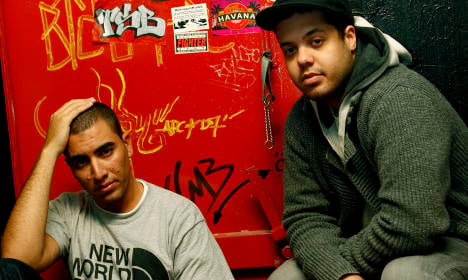IMMIGRATION
‘Refugees can contribute to culture and politics’
Swedish hip hop artist Mohammed Ryback says many of his best friends are former refugees and argues that Swedes need to pay more attention to their achievements amid the current influx of new arrivals.
Published: 22 September 2015 07:24 CEST

Mohammed Ryback (right) is part of Swedish hip hop duo Mohammed Ali. Photo: Mats Andersson/TT
I am surrounded by refugees.
This is something I've thought about a lot over the last few weeks, due to the current refugee crisis. Most of my friends have been refugees or are the children of refugees. Those closest to me fled from wars, dictatorships, poverty, misery and discrimination.
This includes the Salazar brothers who are my bosses at Redline Records who fled from Pinochet and some of my best friends such as hip hop artists Stor and Mack Beats.
Ali from my group Mohammed Ali came to Sweden in 1991 when he arrived on a refugee boat which docked on the coast of Gotland.
My wife Nabila Abdul Fattah's family fled war in Lebanon. My mother fled the war in Somalia.
Now, not many people see us as refugees anymore, but I cannot stop thinking that we were once just that. That it was once us who fled to another country in the hope of a better life. That we once were the causes of “public concern”.
The fact we were refugees was debated in the 70s, 80s, and 90s in just the same way as it is today. We were also part of a wave of refugees that swept across Sweden.
I do not remember the debates – I was six years old when I arrived in Sweden – but I can imagine there was much the same rhetoric and emotion that we hear and see today. Discussions about how Sweden would cope with the refugees, how negatively those people might affect Swedish society. About the fact that so many refugees were arriving in Sweden, such a small country.
But nowadays, some of the refugees from back then are music artists, politicians, activists, journalists, actors, film directors and professional athletes who have contributed to Sweden. The Swedish hip hop you listen to today is thanks to refugees.
24 years after I moved here, I am among the Swedes also getting used to the new wave of refugees in Sweden, a wave of refugees that is much larger than the one I arrived with. But at the same time I also believe that the future of Swedish culture lies with the newly arrived refugees.
Who knows, maybe there is a future DJ Salla right now in any refugee living in Sweden. A future music producer like Masse Salazar in another. A hiphop duo like Mohammed Ali in a third place. Perhaps there is a future director like Josef Fares, a future comedian like Özz Nujen and a future artist like Laleh and waiting for asylum accommodation right now.
No one could foresee that three children of refugees who fled from Chile would start up and run one of Sweden's biggest hip hop companies.
Now just as them, many refuse to see the skills and abilities – and everything new that they might learn – among those fleeing here.
Instead we discuss fears, prejucides and consequences, rather than visualising a great future for Swedish culture.
Mohammed Ryback is a Swedis hip hop artist. This is a translated version of a debate article originally published in Swedish by Politism.
Url copied to clipboard!


 Please whitelist us to continue reading.
Please whitelist us to continue reading.